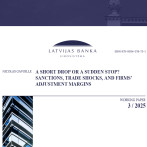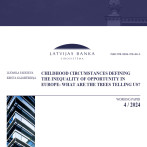External environment remains overcast

The flash estimate for Latvia's economic growth in the second quarter, in a way, confirms that the GDP decline observed at the beginning of the year was caused by unfavourable development in some sectors on account of temporary factors (e.g. weather conditions) whose impact is likely to diminish by the end of the year.
However, the momentary weakness coincided with a slowdown in the global growth, weighing down on more dynamic economic development also in Latvia. According to the flash estimate of the Central Statistical Bureau (CSB), in the second quarter of 2019 GDP grew by 0.8% and 3.0% quarter-on-quarter and year-on-year respectively (adjusted data).
Growth was most likely supported by the services sectors, since the monthly data on the dynamics of manufacturing in April–May and the data on the electricity generation in April–June suggest that the total industrial production output growth rate remained rather subdued due to both external and internal factors. For instance, the wood-processing industry was negatively affected by the situation in the external market, while hydroelectric plants generated less electricity due to weather conditions. The Nord Pool intraday data suggest that the electricity output is not promising for July either.
Short-term data show that the contribution of exports to growth, inter alia, the wholesale trade development, is likely to remain weak in the second quarter. Moreover, the leap in retail trade turnover observed in April was not sufficiently strong as to ensure a lasting impact. Much lower indicators were recorded in May and June. The opening of new shopping and leisure centres, e.g. the opening of "Akropole" in April, is likely to attract more customers in the short term. However, the market reallocation effect may be a stronger factor in the longer term, with some market participants relocating their existing trading venues and others closing their trading venues due to insufficient customer flows. In addition, other new shopping and leisure opportunities are likely to become available in the coming quarters. Moreover, the income growth remains stable and currently supports the trade sector.
According to the European Commission data published in July, Latvia's confidence indicators (that for the construction sector in particular) have weakened overall. It is rather paradoxical that the surveyed sector representatives are more pessimistic that the surveyed consumers, with the consumer confidence indicator being the only indicator to have improved somewhat. Over the last months, the number of job vacancies registered with the State Employment Agency declined slightly, thus narrowing the job-finding opportunities for potential employees. Nevertheless, the number of job vacancies is still notably higher than in the respective period of 2018.
The global growth is also moderating with no improvement in its outlook. For instance, in July the International Monetary Fund revised the projected growth rate of the global economy slightly downwards (by 0.1 pp), with the economic growth estimate of Latvia's trade partners such as Germany and Russia also revised downwards, highlighting the impact of the US trade policy on global supply chains, the persisting uncertainty about the Brexit outcome and geopolitical tensions. The above factors remain relevant. Moreover, upon taking over as the UK's new Prime Minister, Boris Johnson committed himself to deliver on his promises, thus increasing the risk of a no-deal Brexit. Under such circumstances, external economic environment provides relatively little support for stronger economic growth in Latvia.
In June 2019, Latvijas Banka already revised the economic growth figures for 2019 downwards to 2.9%. The CSB flash estimate of growth in the second quarter confirms that the impact of some factors has been short-lived. Overall, in the first half of the year growth notably decelerated as compared to the corresponding period of the previous year. While it should not be viewed as a warning signal of a substantial economic downturn in Latvia, the development of the domestic and external factors is unlikely to bring any positive surprises either.
More detailed information on the sectoral development and the dynamics of GDP expenditure components will be available only in a month.
Textual error
«… …»






